大学英语综合教程课文翻译
大学英语综合教程unit1 textA课文翻译
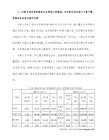
10) Have fun. Play is good for you and helps you refocus on other pursuits. It truly does recharge your batteries. Find the balance between recreation and dedication. Neither extreme brings ultimate satisfaction. Viewing life as only a party or only a chore will never satisfy your soul. Life -- and especially college -- is an adventure. Don't get so caught up in the ultimate goal that you forget to enjoy the jourclass. Woody Allen once said that 80 percent of life is just showing up. There is no substitute for presence. Ever ask someone to take notes for you? Did you ever understand them?
What makes the difference? From my experience, there are 10 rules every freshman should know.
1) Be a warrior. Warriors are never surprised. That means listening in class, staying alert and asking questions. That means doing all the assignments on time. Go into each class expecting an unannounced quiz.
全新版大学英语综合教程3课文原文及翻译

全新版大学英语综合教程3课文原文及翻译《全新版大学英语综合教程 3 课文原文及翻译》大学英语学习对于许多学生来说是提升语言能力和拓展国际视野的重要途径。
全新版大学英语综合教程 3 更是其中的重要组成部分。
以下将为您呈现部分课文的原文及对应的翻译,希望能对您的学习有所帮助。
课文一:The Human Touch原文:John Blanchard stood up from the bench, straightened his Army uniform, and studied the crowd of people making their way through Grand Central Station翻译:约翰·布兰查德从长凳上站起身来,整了整军装,审视着穿过中央车站的人群。
原文:He looked for the girl whose heart he knew, but whose face he didn't, the girl with the rose翻译:他在寻找那个他明知其心却不知其貌的女孩,那个带着玫瑰的女孩。
原文:His interest in her had begun thirteen months before in a Florida library翻译:他对她的兴趣始于十三个月前在佛罗里达州的一家图书馆里。
原文:Taking a book off the shelf he found himself intrigued, not with the words of the book, but with the notes penciled in the margin 翻译:他从书架上取下一本书,发现自己感兴趣的不是书中的文字,而是写在页边空白处的铅笔字批注。
原文:The soft handwriting reflected a thoughtful soul and insightful mind翻译:那柔和的笔迹反映出一个深思熟虑、富有洞察力的灵魂。
大学英语综合教程3课文翻译
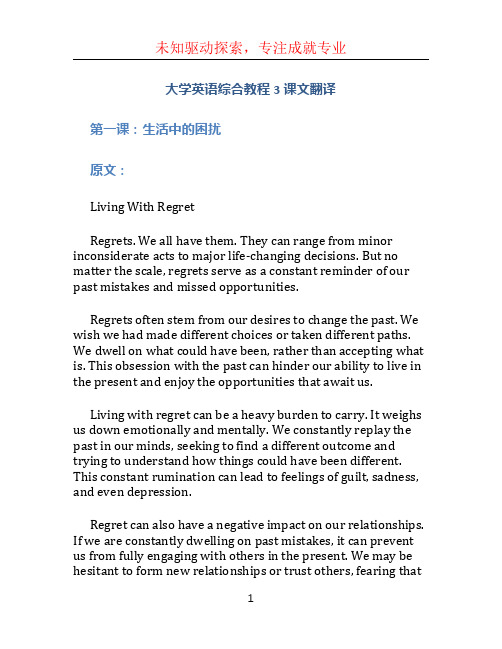
大学英语综合教程3课文翻译第一课:生活中的困扰原文:Living With RegretRegrets. We all have them. They can range from minor inconsiderate acts to major life-changing decisions. But no matter the scale, regrets serve as a constant reminder of our past mistakes and missed opportunities.Regrets often stem from our desires to change the past. We wish we had made different choices or taken different paths. We dwell on what could have been, rather than accepting what is. This obsession with the past can hinder our ability to live in the present and enjoy the opportunities that await us.Living with regret can be a heavy burden to carry. It weighs us down emotionally and mentally. We constantly replay the past in our minds, seeking to find a different outcome and trying to understand how things could have been different. This constant rumination can lead to feelings of guilt, sadness, and even depression.Regret can also have a negative impact on our relationships. If we are constantly dwelling on past mistakes, it can prevent us from fully engaging with others in the present. We may be hesitant to form new relationships or trust others, fearing thatwe will make the same mistakes again. This fear and hesitancy can limit our social connections and prevent us from experiencing the joys of deep and meaningful relationships.So how do we break free from the grip of regret? It starts with acceptance. Accepting that we cannot change the past, no matter how much we wish we could. We must forgive ourselves for our mistakes and learn from them. It is through learning and growth that we can move forward and create a better future.In addition to acceptance, it is important to focus on the present moment. By practicing mindfulness and being fully present in our daily lives, we can let go of the past and embrace the opportunities that come our way. Life is constantly changing, and if we are too focused on what has already happened, we may miss out on the beauty of what is happening right now.Regrets are a natural part of life, but they do not have to consume us. By accepting the past, focusing on the present, and learning from our mistakes, we can live a life free from the burden of regret.翻译:带着遗憾生活遗憾,我们都有。
新标准大学英语综合教程1(Unit1-Unit6课文翻译)
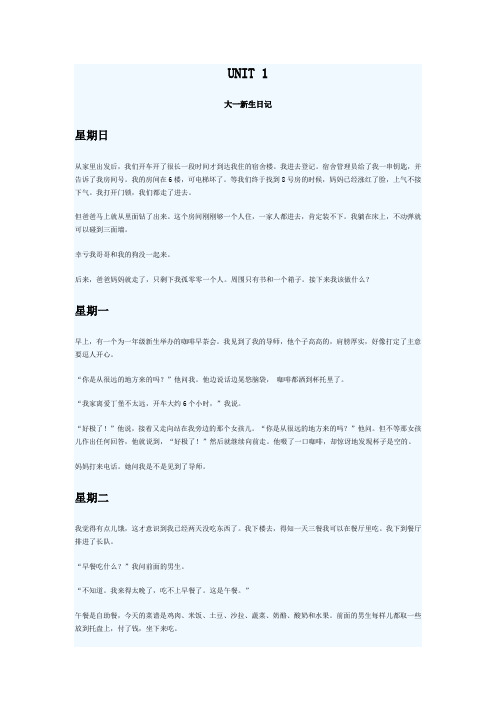
UNIT 1大一新生日记星期日从家里出发后,我们开车开了很长一段时间才到达我住的宿舍楼。
我进去登记。
宿舍管理员给了我一串钥匙,并告诉了我房间号。
我的房间在6楼,可电梯坏了。
等我们终于找到8号房的时候,妈妈已经涨红了脸,上气不接下气。
我打开门锁,我们都走了进去。
但爸爸马上就从里面钻了出来。
这个房间刚刚够一个人住,一家人都进去,肯定装不下。
我躺在床上,不动弹就可以碰到三面墙。
幸亏我哥哥和我的狗没一起来。
后来,爸爸妈妈就走了,只剩下我孤零零一个人。
周围只有书和一个箱子。
接下来我该做什么?星期一早上,有一个为一年级新生举办的咖啡早茶会。
我见到了我的导师,他个子高高的,肩膀厚实,好像打定了主意要逗人开心。
“你是从很远的地方来的吗?”他问我。
他边说话边晃悠脑袋,咖啡都洒到杯托里了。
“我家离爱丁堡不太远,开车大约6个小时,”我说。
“好极了!”他说,接着又走向站在我旁边的那个女孩儿。
“你是从很远的地方来的吗?”他问。
但不等那女孩儿作出任何回答,他就说到,“好极了!”然后就继续向前走。
他啜了一口咖啡,却惊讶地发现杯子是空的。
妈妈打来电话。
她问我是不是见到了导师。
星期二我觉得有点儿饿,这才意识到我已经两天没吃东西了。
我下楼去,得知一天三餐我可以在餐厅里吃。
我下到餐厅排进了长队。
“早餐吃什么?”我问前面的男生。
“不知道。
我来得太晚了,吃不上早餐了。
这是午餐。
”午餐是自助餐,今天的菜谱是鸡肉、米饭、土豆、沙拉、蔬菜、奶酪、酸奶和水果。
前面的男生每样儿都取一些放到托盘上,付了钱,坐下来吃。
我再也不觉得饿了。
妈妈打电话来。
她问我有没有好好吃饭。
星期三早上9点钟我要去听一个讲座。
我醒时已经8:45了。
竟然没有人叫我起床。
奇怪。
我穿好衣服,急匆匆地赶到大讲堂。
我在一个睡眼惺忪的女生旁边坐下。
她看了看我,问:“刚起床?”她是怎么看出来的?讲座进行了1个小时。
结束时我看了看笔记,我根本就看不懂自己写的字。
那个女生名叫苏菲,和我一样,也是英语文学专业的学生。
大学英语综合教程课文原文翻译对照
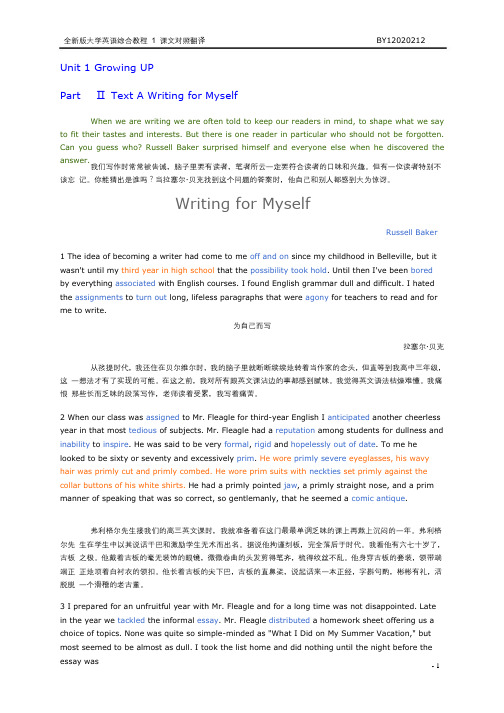
全新版大学英语综合教程1 课文对照翻译BY12020212 Unit 1 Growing UPPart ⅡText A Writing for MyselfWhen we are writing we are often told to keep our readers in mind, to shape what we say to fit their tastes and interests. But there is one reader in particular who should not be forgotten. Can you guess who? Russell Baker surprised himself and everyone else when he discovered the answer.我们写作时常常被告诫,脑子里要有读者,笔者所云一定要符合读者的口味和兴趣。
但有一位读者特别不该忘记。
你能猜出是谁吗?当拉塞尔·贝克找到这个问题的答案时,他自己和别人都感到大为惊讶。
Writing for MyselfRussell Baker 1 The idea of becoming a writer had come to me off and on since my childhood in Belleville, but it wasn't until my third year in high school that the possibility took hold. Until then I've been boredby everything associated with English courses. I found English grammar dull and difficult. I hated the assignments to turn out long, lifeless paragraphs that were agony for teachers to read and for me to write.为自己而写拉塞尔·贝克从孩提时代,我还住在贝尔维尔时,我的脑子里就断断续续地转着当作家的念头,但直等到我高中三年级,这一想法才有了实现的可能。
全新版大学英语综合教程2课文翻译及课后答案(全)
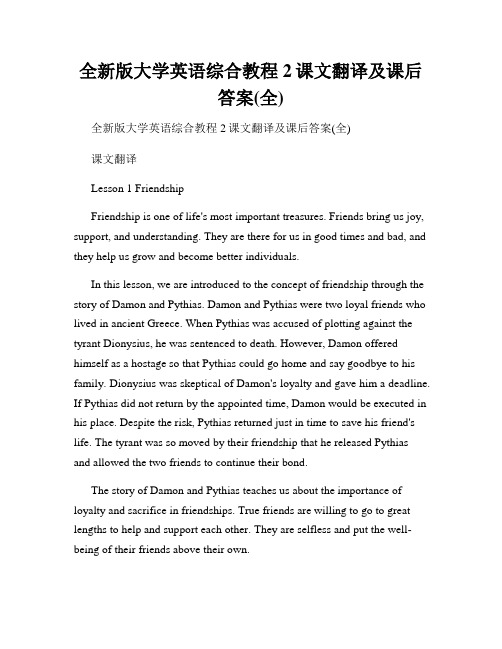
全新版大学英语综合教程2课文翻译及课后答案(全)全新版大学英语综合教程2课文翻译及课后答案(全)课文翻译Lesson 1 FriendshipFriendship is one of life's most important treasures. Friends bring us joy, support, and understanding. They are there for us in good times and bad, and they help us grow and become better individuals.In this lesson, we are introduced to the concept of friendship through the story of Damon and Pythias. Damon and Pythias were two loyal friends who lived in ancient Greece. When Pythias was accused of plotting against the tyrant Dionysius, he was sentenced to death. However, Damon offered himself as a hostage so that Pythias could go home and say goodbye to his family. Dionysius was skeptical of Damon's loyalty and gave him a deadline. If Pythias did not return by the appointed time, Damon would be executed in his place. Despite the risk, Pythias returned just in time to save his friend's life. The tyrant was so moved by their friendship that he released Pythias and allowed the two friends to continue their bond.The story of Damon and Pythias teaches us about the importance of loyalty and sacrifice in friendships. True friends are willing to go to great lengths to help and support each other. They are selfless and put the well-being of their friends above their own.Friendship is not only based on loyalty and sacrifice but also on trust and understanding. Friends should be able to confide in each other and know that their secrets are safe. They should also be able to communicate openly and honestly, even when it's difficult. When trust and understanding exist within a friendship, it becomes a safe haven where individuals can be themselves without fear of judgment.Lesson 2 SuccessSuccess means different things to different people. For some, success is measured by wealth and material possessions. For others, success is achieving personal goals and finding fulfillment in life.This lesson introduces us to the story of Jack and the Beanstalk. Jack, a poor boy, was given magic beans in exchange for his family's cow. These beans grew into a giant beanstalk that reached the sky. Jack bravely climbed the beanstalk and discovered a giant's castle where he found treasures and riches beyond imagination. Jack's journey represents the pursuit of success and the willingness to take risks.Success requires determination, hard work, and a positive mindset. It involves setting goals and working tirelessly to achieve them. Along the way, there may be obstacles and setbacks, but successful individuals persevere and stay focused on their objectives.Success is not solely measured by material wealth but also by personal growth and self-fulfillment. It's about finding happiness and contentment in one's achievements and embracing the journey rather than just the destination.课后答案Lesson 1 Friendship1. What is one of life's most important treasures?- Friendship.2. What do friends bring us?- Joy, support, and understanding.3. Who were Damon and Pythias?- They were two loyal friends who lived in ancient Greece.4. What happened to Pythias?- He was accused of plotting against the tyrant Dionysius and was sentenced to death.5. What did Damon do to help Pythias?- Damon offered himself as a hostage so that Pythias could go home and say goodbye to his family.6. What did Dionysius do to test Damon's loyalty?- He gave Damon a deadline. If Pythias did not return by the appointed time, Damon would be executed in his place.7. Did Pythias return in time?- Yes, Pythias returned just in time to save his friend's life.8. How did the tyrant react to Damon and Pythias' friendship?- The tyrant was moved by their friendship and released Pythias, allowing the two friends to continue their bond.Lesson 2 Success1. How do different people define success?- Different people define success in different ways. For some, it's measured by wealth and material possessions. For others, it's about achieving personal goals and finding fulfillment in life.2. What did Jack receive in exchange for his family's cow?- Jack received magic beans.3. What did the magic beans grow into?- The magic beans grew into a giant beanstalk that reached the sky.4. What did Jack find in the giant's castle?- Jack found treasures and riches beyond imagination in the giant's castle.5. What qualities are required for success?- Determination, hard work, and a positive mindset are required for success.6. What should individuals do when facing obstacles and setbacks?- Successful individuals should persevere and stay focused on their objectives when facing obstacles and setbacks.7. How should success be measured?- Success should not only be measured by material wealth but also by personal growth and self-fulfillment. It's about finding happiness and contentment in one's achievements and embracing the journey.注意:以上仅为翻译示例及课后答案,具体课文内容请参照教材。
全新版大学英语综合教程3课文原文及翻译完整版
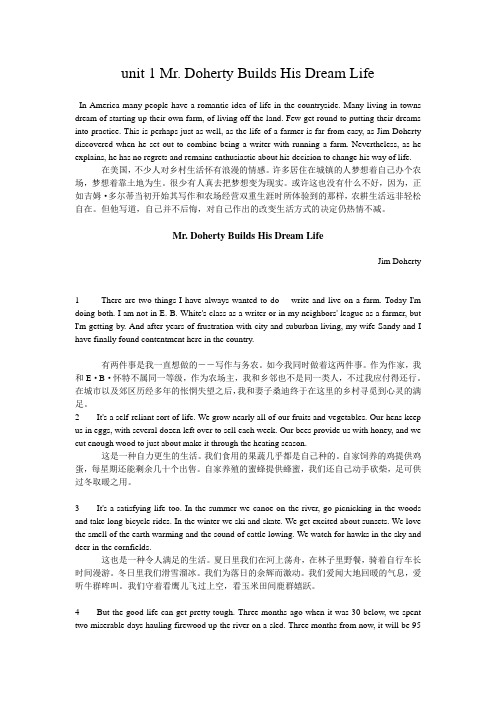
unit 1 Mr. Doherty Builds His Dream LifeIn America many people have a romantic idea of life in the countryside. Many living in towns dream of starting up their own farm, of living off the land. Few get round to putting their dreams into practice. This is perhaps just as well, as the life of a farmer is far from easy, as Jim Doherty discovered when he set out to combine being a writer with running a farm. Nevertheless, as he explains, he has no regrets and remains enthusiastic about his decision to change his way of life.在美国,不少人对乡村生活怀有浪漫的情感。
许多居住在城镇的人梦想着自己办个农场,梦想着靠土地为生。
很少有人真去把梦想变为现实。
或许这也没有什么不好,因为,正如吉姆·多尔蒂当初开始其写作和农场经营双重生涯时所体验到的那样,农耕生活远非轻松自在。
但他写道,自己并不后悔,对自己作出的改变生活方式的决定仍热情不减。
Mr. Doherty Builds His Dream LifeJim Doherty1 There are two things I have always wanted to do -- write and live on a farm. Today I'm doing both. I am not in E. B. White's class as a writer or in my neighbors' league as a farmer, but I'm getting by. And after years of frustration with city and suburban living, my wife Sandy and I have finally found contentment here in the country.有两件事是我一直想做的――写作与务农。
全新版大学英语综合教程课文原文及翻译
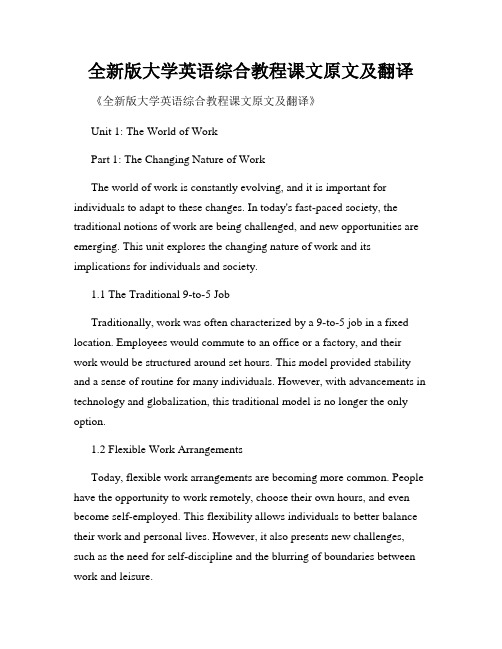
全新版大学英语综合教程课文原文及翻译《全新版大学英语综合教程课文原文及翻译》Unit 1: The World of WorkPart 1: The Changing Nature of WorkThe world of work is constantly evolving, and it is important for individuals to adapt to these changes. In today's fast-paced society, the traditional notions of work are being challenged, and new opportunities are emerging. This unit explores the changing nature of work and its implications for individuals and society.1.1 The Traditional 9-to-5 JobTraditionally, work was often characterized by a 9-to-5 job in a fixed location. Employees would commute to an office or a factory, and their work would be structured around set hours. This model provided stability and a sense of routine for many individuals. However, with advancements in technology and globalization, this traditional model is no longer the only option.1.2 Flexible Work ArrangementsToday, flexible work arrangements are becoming more common. People have the opportunity to work remotely, choose their own hours, and even become self-employed. This flexibility allows individuals to better balance their work and personal lives. However, it also presents new challenges, such as the need for self-discipline and the blurring of boundaries between work and leisure.1.3 The Gig EconomyThe rise of the gig economy is another significant change in the world of work. In this model, individuals take on short-term or freelance jobs, often facilitated by online platforms. This provides them with more autonomy and the ability to pursue multiple income streams. However, it also means less job security and benefits compared to traditional employment.1.4 The Importance of Lifelong LearningWith the changing nature of work, the importance of lifelong learning cannot be overstated. Individuals need to continually update their skills and knowledge in order to remain competitive in the job market. This includes developing new technological competencies and adaptability to navigate future changes in the workplace.Part 2: The Impact of Work on Identity and Well-beingWork plays a significant role in shaping individual identity and overall well-being. How individuals perceive their work and the meaning they derive from it can greatly impact their satisfaction and happiness.2.1 Work as a Source of IdentityFor many people, work is not just a way to earn a living but also a source of identity and purpose. The type of work one engages in can be closely tied to personal values and ambitions. However, it is important to recognize that work should not be the sole determinant of a person's self-worth. Finding a balance between work and other aspects of life is crucial for overall well-being.2.2 Work-Life BalanceAchieving work-life balance is a constant challenge in today's connected world. The boundaries between work and personal life can easily blur, leading to increased stress and burnout. Employers and individuals need to actively promote strategies and policies that enable employees to have a healthy integration of work and personal life.2.3 The Pursuit of Meaningful WorkMany individuals strive to find work that is not only financially rewarding but also personally fulfilling. Meaningful work gives individuals a sense of purpose and satisfaction. This can be achieved by aligning personal values and passions with one's chosen career path.2.4 Work and Mental HealthThe relationship between work and mental health is complex. While work can provide a sense of structure and purpose, it can also contribute to stress and anxiety. Employers and society as a whole need to prioritize mental health support in the workplace and foster a culture that promotes work-life balance and overall well-being.ConclusionThe world of work is undergoing significant changes, requiring individuals to adapt and embrace new opportunities. The impact of work on identity and well-being cannot be underestimated. It is crucial for individuals, employers, and society to work together to create a more balanced and fulfilling work environment. By recognizing the evolving nature of work andaddressing its challenges, we can create a future where individuals find meaning and satisfaction in their careers.。
新大学英语综合教程1-3单元课文翻译

Unit one 绿化,永无止境【1】环保主义思想已经深深的扎根于校园。
你可以看到环保运动已经蔓延到了全国,从加利福利亚大学戴维斯分校的“零浪费”运动场到纽约州瓦瑟学院07级学生献给学校的价值10000美元的太阳能电池板。
环保意识已经深入到同学们的内心,他们通过开展一些竞赛活动来推进回收再利用,并且大幅减少学生宿舍能源的使用。
学校里还开设了一些与环境相关的课程与专业,甚至还设立了一些奖学金。
这些新的举措是很有意义的。
高等教育明确定位,不仅是要为社会培养有环保意识的公民,还要培养环保工程师,环保建筑师和环保政策的制定者。
康奈尔大学的校长David Skorton说得好:“可持续发展势在必行。
”【2】想要寻找环保运动已经广泛开展的证据,只要关注全国各大学都热衷参与RecycleMania 竞赛就能找到答案。
2008年的冠军不是像哈佛和斯坦福大学这些以环保著称的著名学府,而是在密歇根州的一所微不足道的大学——卡拉马祖大学。
在十周的比赛中,卡拉马祖大学的同学们总共回收利用了59%的废物。
(哈佛是27%,斯坦福是30%)。
环保社团的成员们还开展了名为“宿舍风暴”的活动。
他们在每个寝室都埋伏了同学来专门观察和宣传那些减少浪费的行为。
他们还收集校内垃圾桶内的可回收材料——甚至运送塑料泡沫和废旧电脑到公司以便加工后再利用。
他们把废弃的书拆开来使得纸张可以再利用。
一些旧的椅子、杯子、扬声器和钢琴都在校园的二手货交易中重获新生,满屋子都是一些二手货,当然还是免费的。
【3】环保建筑也如春笋般突然出现在校园中,从杜克大学里带有环保屋顶的“智慧屋” (一间同时可作为绿色生活实验室的宿舍)到加州大学在默赛德新校区,那里的所有建筑都达到了美国绿色建筑委员会制定的标准。
缅因州的福尔曼大学也实施了一项最不寻常的计划。
在2008年6月,福尔曼大学与南方生活杂志协力创建了名为“绝壁村屋”的太阳能展示区。
它占地3400平方英尺,在将来也许会成为环保主义者的梦想住宅。
全新版大学英语综合教程4课文原文及翻译
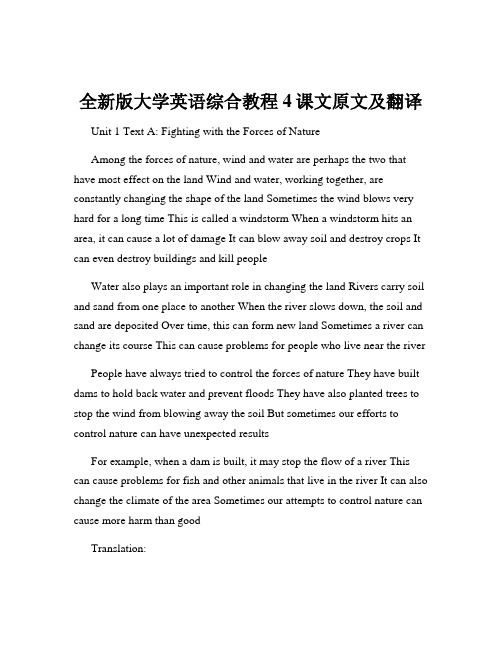
全新版大学英语综合教程4课文原文及翻译Unit 1 Text A: Fighting with the Forces of NatureAmong the forces of nature, wind and water are perhaps the two that have most effect on the land Wind and water, working together, are constantly changing the shape of the land Sometimes the wind blows very hard for a long time This is called a windstorm When a windstorm hits an area, it can cause a lot of damage It can blow away soil and destroy crops It can even destroy buildings and kill peopleWater also plays an important role in changing the land Rivers carry soil and sand from one place to another When the river slows down, the soil and sand are deposited Over time, this can form new land Sometimes a river can change its course This can cause problems for people who live near the riverPeople have always tried to control the forces of nature They have built dams to hold back water and prevent floods They have also planted trees to stop the wind from blowing away the soil But sometimes our efforts to control nature can have unexpected resultsFor example, when a dam is built, it may stop the flow of a river This can cause problems for fish and other animals that live in the river It can also change the climate of the area Sometimes our attempts to control nature can cause more harm than goodTranslation:在自然力量中,风和水也许是对陆地影响最大的两种力量。
全新版大学英语综合教程 课文原文及翻译

式的看法。
Learning, Chinese-Sty a month in the spring of 1987, my wife Ellen and I lived in the bustling eastern
我的中国同行�除了少数几个人外�对此事的态度与金陵饭店工作人员一样。既然大
人知道怎么把钥匙塞进槽口——这是处理槽口一事的最终目的� 既然孩子还很年幼�还没
有灵巧到可以独自完成要做的动作�让他自己瞎折腾会有什么好处呢�他很有可能会灰心丧
气发脾气——这当然不是所希望的结果。为什么不教他怎么做呢�他会高兴�他还能早些学
我俩颇为同情地听着这一番道理�解释道�首先�我们并不在意本杰明能不能把钥匙
5 I soon realized that this incident was directly relevant to our assigned tasks in China: to
investigate the ways of early childhood education (especially in the arts), and to throw light on
in the difference between Chinese and American ideas of education came not in the classroom but
in the lobby of the Jinling Hotel where we stayed in Nanjing. 中国式的学习风格
─ and on occasion would frown slightly, as if considering us to be neglecting our parental duties. 我和埃伦都满不在乎�任由本杰明拿着钥匙在钥匙的槽口鼓捣。他的探索行为似乎并
新编大学英语综合教程课文翻译第一册

Unit 1 Personal Relationships1-1 The gift of life【1】炸弹落在了这个小村庄里。
在可怕的越南战争期间,谁也不知道这些炸弹要轰炸什么目标,而它们却落在了一所由传教士们办的小孤儿院内。
【2】传教士和一、两个孩子已经丧生,还有几个孩子受了伤,其中有一个小女孩,8岁左右,她的双腿被炸伤。
【3】几小时后,医疗救援小组到了。
救援小组由一名年轻的美国海军医生和一名同样年轻的海军护士组成。
他们很快发现有个小女孩伤势严重。
如果不立即采取行动,显然她将因失血过多和休克而死亡。
【4】他们明白必须给小女孩输血,但是他们的医药用品很有限,没有血浆,因此需要一种相配的血型。
快速的血型测定显示两名美国人的血型都不合适。
几个没有受伤的孤儿却有相配的血型。
【5】这位医生会讲一点越南语,护士会讲一点法语,但只有中学的法语水平。
孩子们不会说英语,只会说一点法语。
医生和护士用少得可怜的一点共同语言,结合大量的手势语,努力向这些受惊吓的孩子们解释说,除非他们能输一些血给自己的小伙伴,否则她将必死无疑。
接着问他们是否有人愿意献血来救小女孩。
【6】对医生和护士的请求,孩子们(只是)瞪大眼睛,一声不吭。
此时小病人生命垂危。
然而,只有这些受惊吓的孩子中有人自愿献血,他们才能够得到血。
过了好一会儿,一只小手慢慢地举了起来,然后垂了下去,一会儿又举了起来。
【7】"噢,谢谢。
" 护士用法语说。
"你叫什么名字?"【8】"兴," 回答道。
【9】兴很快被抱到一张床上,手臂用酒精消毒后,针就扎了进去。
在整个过程中,兴僵直地躺着,没有出声。
【10】过了一会儿,他发出了一声长长的抽泣,但立即用那只可以活动的手捂住了自己的脸。
【11】"兴,疼吗?" 医生问。
【12】兴默默地摇了摇头,但一会儿忍不住又抽泣起来,并又一次试图掩饰自己的哭声。
医生又问是否是插在手臂上的针弄疼了他,兴又摇了摇头。
全新版大学英语综合教程1、2课文翻译

AppendixⅡChinese Translations of Text B (Units 1-8)第一单元成长课文B夏天打工时,作者常常替巴卢先生修剪草坪。
惟一的问题是,巴卢先生似乎从来没钱支付工钱。
然而,他实际上所给予的却远比工钱珍贵。
夏日阅读迈克尔·多里斯十四岁那年,我在暑假里替人修剪草坪挣些钱,不出几个星期,我就有了不少客户。
客户们种植的花卉我得记住不能剪去,他们会将东西遗落在草地上或故意插在地里,通过这些我逐渐认识了他们。
我对大多数客户了解至深,事先就能知道他们会抱怨些什么,哪些特别的要求不能掉以轻心。
(1)而且,我从邻居偏爱的付款方式中了解到了一点他们的情况:有的按干的活儿给钱,有的按月支付——或者有的压根儿不付钱。
巴卢先生属于最后一类,而且他总有理由。
有一天他兑不开一张五十元的钞票,又有一天他支票用完了,还有一天我上门时他干脆就溜出去了。
撇开钱这档子事,他倒也还是个挺不错的老头,每次看见我,老远就挥手或脱帽致意。
我猜他退休金不多,可能出过工伤,整不了自己的园子。
没错,我全都记着帐,可我对这点钱并没太在意。
(2)也就是剪剪草,何况巴卢先生住宅外面的那一点草坪修剪起来花不了多少时间。
到了一年中最热的七月中旬,一天傍晚前,我走过他家,他开了门,示意我进去。
门厅里凉凉的,帘子遮去了阳光,过了一会儿我的眼睛才适应室内的暗淡光线。
“我欠你工钱,”巴卢先生开口道,“不过……”我想省得他费神找新的借口了,就说,“没事。
别放在心上。
”“银行把我的账弄错了,”他没理我的碴儿,接着说。
“一两天里就会改过来。
在这当儿,我想你不妨挑——两本书作为我的首付款。
”他朝墙那边指了指,我这才发现到处都堆着书。
就跟图书馆一样,只不过没有分门别类罢了。
“别着急,”巴卢先生鼓动说。
“读也好,借也好,留着也行。
找你喜欢的。
你平常都爱读什么书啊?”“我不知道。
”我的确不知道。
我通常是弄到什么就读什么,从药房里买到的平装书,图书馆里借得到的书、杂志,到麦片包装盒背面的说明,还有连环漫画,什么都看。
全新版大学英语综合教程(第二版)第一册课文翻译及课后答案
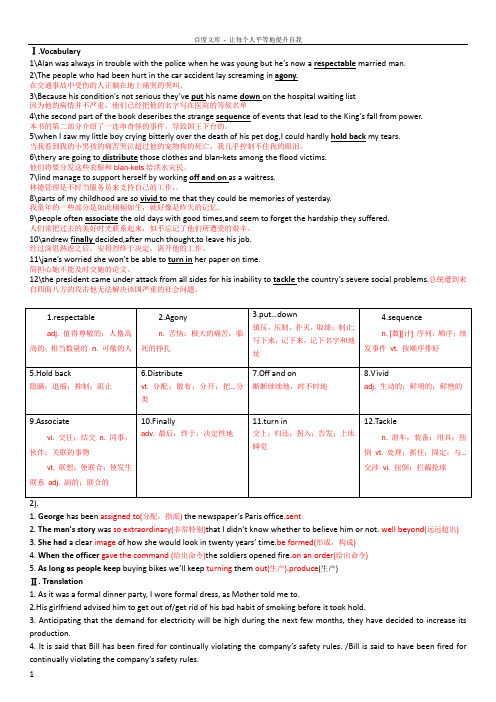
Ⅰ.Vocabulary1\Alan was always in trouble with the police when he was young but he’s now a respectable married man.2\The people who had been hurt in the car accident lay screaming in agony.在交通事故中受伤的人正躺在地上痛哭的哭叫。
3\Because his condition’s not serious they’v e put his name down on the hospital waiting list因为他的病情并不严重,他们已经把他的名字写在医院的等候名单4\the second part of the book deseribes the strange sequence of events that lead to the King’s fall from power.本书的第二部分介绍了一连串奇怪的事件,导致国王下台的。
5\when I saw my little boy crying bitterly over the death of his pet dog,I could hardly hold back my tears.当我看到我的小男孩的痛苦哭泣超过他的宠物狗的死亡,我几乎控制不住我的眼泪。
6\thery are going to distribute t hose clothes and blan-kets among the flood victims.他们将要分发这些衣服和blan-kets给洪水灾民。
7\lind manage to support herself by working off and on as a waitress.林德管理是不时当服务员来支持自己的工作,。
新标准大学英语综合教程3课文翻译(1-10单元30篇)

Unit 1-1Catching crabs1 In the fall of our final year, our mood changed. The relaxed atmosphere of the preceding summer semester, the impromptu ball games, the boating on the Charles River, the late-night parties had disappeared, and we all started to get our heads down, studying late, and attendance at classes rose steeply again. We all sensed we were coming to the end of our stay here, that we would never get a chance like this again, and we became determined not to waste it. Most important of course were the final exams in April and May in the following year. No one wanted the humiliation of finishing last in class, so the peer group pressure to work hard was strong. Libraries which were once empty after five o'clock in the afternoon were standing room only until the early hours of the morning, and guys wore the bags under their eyes and their pale, sleepy faces with pride, like medals proving their diligence.2 But there was something else. At the back of everyone's mind was what we would do next, when we left university in a few months' time. It wasn't always the high flyers with the top grades who knew what they were going to do. Quite often it was the quieter, less impressive students who had the next stages of their life mapped out. One had landed a job in his brother's advertising firm in Madison Avenue, another had got a script under provisional acceptance in Hollywood. The most ambitious student among us was going to work as a party activist at a local level. We all saw him ending up in the Senate or in Congress one day. But most people were either looking to continue their studies, or to make a living with a white-collar job in a bank, local government, or anything which would pay them enough to have a comfortable time in their early twenties, and then settle down with a family, a mortgage and some hope of promotion.3 I went home at Thanksgiving, and inevitably, my brothers and sisters kept asking me what I was planning to do. I didn't know what to say. Actually, I did know what to say, but I thought they'd probably criticize me, so I told them what everyone else was thinking of doing.4 My father was watching me but saying nothing. Late in the evening, he invited me to his study. We sat down and he poured 抓螃蟹1.大学最后一年的秋天,我们的心情变了。
大学英语综合教程课文原文及翻译
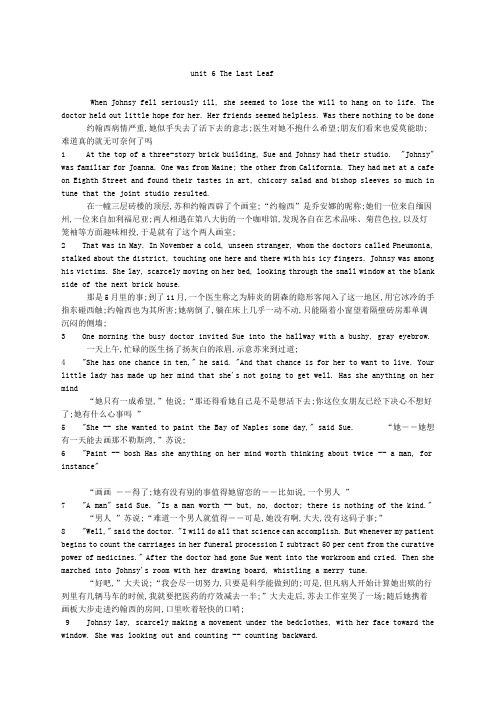
unit 6 The Last LeafWhen Johnsy fell seriously ill, she seemed to lose the will to hang on to life. The doctor held out little hope for her. Her friends seemed helpless. Was there nothing to be done 约翰西病情严重,她似乎失去了活下去的意志;医生对她不抱什么希望;朋友们看来也爱莫能助;难道真的就无可奈何了吗1 At the top of a three-story brick building, Sue and Johnsy had their studio. "Johnsy" was familiar for Joanna. One was from Maine; the other from California. They had met at a cafe on Eighth Street and found their tastes in art, chicory salad and bishop sleeves so much in tune that the joint studio resulted.在一幢三层砖楼的顶层,苏和约翰西辟了个画室;“约翰西”是乔安娜的昵称;她们一位来自缅因州,一位来自加利福尼亚;两人相遇在第八大街的一个咖啡馆,发现各自在艺术品味、菊苣色拉,以及灯笼袖等方面趣味相投,于是就有了这个两人画室;2 That was in May. In November a cold, unseen stranger, whom the doctors called Pneumonia, stalked about the district, touching one here and there with his icy fingers. Johnsy was among his victims. She lay, scarcely moving on her bed, looking through the small window at the blank side of the next brick house.那是5月里的事;到了11月,一个医生称之为肺炎的阴森的隐形客闯入了这一地区,用它冰冷的手指东碰西触;约翰西也为其所害;她病倒了,躺在床上几乎一动不动,只能隔着小窗望着隔壁砖房那单调沉闷的侧墙;3 One morning the busy doctor invited Sue into the hallway with a bushy, gray eyebrow.一天上午,忙碌的医生扬了扬灰白的浓眉,示意苏来到过道;4 "She has one chance in ten," he said. "And that chance is for her to want to live. Your little lady has made up her mind that she's not going to get well. Has she anything on her mind“她只有一成希望,”他说;“那还得看她自己是不是想活下去;你这位女朋友已经下决心不想好了;她有什么心事吗”5 "She -- she wanted to paint the Bay of Naples some day," said Sue. “她――她想有一天能去画那不勒斯湾,”苏说;6 "Paint -- bosh Has she anything on her mind worth thinking about twice -- a man, for instance"“画画――得了;她有没有别的事值得她留恋的――比如说,一个男人”7 "A man" said Sue. "Is a man worth -- but, no, doctor; there is nothing of the kind."“男人”苏说;“难道一个男人就值得――可是,她没有啊,大夫,没有这码子事;”8 "Well," said the doctor. "I will do all that science can accomplish. But whenever my patient begins to count the carriages in her funeral procession I subtract 50 per cent from the curative power of medicines." After the doctor had gone Sue went into the workroom and cried. Then she marched into Johnsy's room with her drawing board, whistling a merry tune.“好吧,”大夫说;“我会尽一切努力,只要是科学能做到的;可是,但凡病人开始计算她出殡的行列里有几辆马车的时候,我就要把医药的疗效减去一半;”大夫走后,苏去工作室哭了一场;随后她携着画板大步走进约翰西的房间,口里吹着轻快的口哨;9 Johnsy lay, scarcely making a movement under the bedclothes, with her face toward the window. She was looking out and counting -- counting backward.约翰西躺在被子下几乎一动不动,脸朝着窗;她望着窗外,数着数――倒数着数10 "Twelve," she said, and a little later "eleven"; and then "ten," and "nine"; and then "eight" and "seven," almost together.“12,”她数道,过了一会儿“11”,接着数“10”和“9”;再数“8”和“7”,几乎一口同时数下来;11 Sue looked out of the window. What was there to count There was only a bare, dreary yard to be seen, and the blank side of the brick house twenty feet away. An old, old ivy vine climbed half way up the brick wall. The cold breath of autumn had blown away its leaves, leaving it almost bare.苏朝窗外望去;外面有什么好数的呢外面只看到一个空荡荡的沉闷的院子,还有20英尺开外那砖房的侧墙,上面什么也没有;一棵古老的常青藤爬到半墙高;萧瑟秋风吹落了枝叶,藤上几乎光秃秃的; 12 "Six," said Johnsy, in almost a whisper. "They're falling faster now. Three days ago there were almost a hundred. It made my head ache to count them. But now it's easy. There goes another one. There are only five left now."“6”,约翰西数着,声音几乎听不出来;“现在叶子掉落得快多了;三天前差不多还有100片;数得我头都疼;可现在容易了;又掉了一片;这下子只剩5片了;”13 "Five what, dear "“5片什么,亲爱的”14 "Leaves. On the ivy vine. When the last one falls I must go, too. I've known that for three days. Didn't the doctor tell you"“叶子;常青藤上的叶子;等最后一片叶子掉了,我也就得走了;三天前我就知道会这样;大夫没跟你说吗”15 "Oh, I never heard of such nonsense. What have old ivy leaves to do with your getting well Don't be so silly. Why, the doctor told me this morning that your chances for getting well real soon were ten to one Try to take some soup now, and let Sudie go and buy port wine for her sick child."“噢,我从没听说过这种胡说八道;常青藤叶子跟你病好不好有什么关系别这么傻;对了,大夫上午跟我说,你的病十有八九就快好了;快喝些汤,让苏迪给她生病的孩子去买些波尔图葡萄酒来;”16 "You needn't get any more wine," said Johnsy, keeping her eyes fixed out the window. "There goes another. No, I don't want any soup. That leaves just four. I want to see the last one fall before it gets dark. Then I'll go, too. I'm tired of waiting. I'm tired of thinking.I want to turn loose my hold on everything, and go sailing down, down, just like one of those poor, tired leaves."“你不用再去买酒了,”约翰西说道,两眼一直盯着窗外;“又掉了一片;不,我不想喝汤;这一下只剩下4片了;我要在天黑前看到最后一片叶子掉落;那时我也就跟着走了;我都等腻了;也想腻了;我只想撇开一切, 飘然而去,就像那边一片可怜的疲倦的叶子;”17 "Try to sleep," said Sue. "I must call Behrman up to be my model for the old miner. I'll not be gone a minute."“快睡吧,”苏说;“我得叫贝尔曼上楼来给我当老矿工模特儿;我去去就来;”18 Old Behrman was a painter who lived on the ground floor beneath them. He was past sixty and had a long white beard curling down over his chest. Despite looking the part, Behrman was a failure in art. For forty years he had been always about to paint a masterpiece, but had never yet begun it. He earned a little by serving as a model to those young artists who could not pay the price of a professional. He drank gin to excess, and still talked of his coming masterpiece. For the rest he was a fierce little old man, who mocked terribly at softness in any one, and who regarded himself as guard dog to the two young artists in the studio above.老贝尔曼是住在两人楼下底层的一个画家;他已年过六旬,银白色蜷曲的长髯披挂胸前;贝尔曼看上去挺像艺术家,但在艺术上却没有什么成就;40年来他一直想创作一幅传世之作,却始终没能动手;他给那些请不起职业模特的青年画家当模特挣点小钱;他没节制地喝酒,谈论着他那即将问世的不朽之作;要说其他方面,他是个好斗的小老头,要是谁表现出一点软弱,他便大肆嘲笑,并把自己看成是楼上画室里两位年轻艺术家的看护人;19 Sue found Behrman smelling strongly of gin in his dimly lighted studio below. In one corner was a blank canvas on an easel that had been waiting there for twenty-five years to receive the first line of the masterpiece. She told him of Johnsy's fancy, and how she feared she would, indeed, light and fragile as a leaf herself, float away, when her slight hold upon the world grew weaker. Old Behrman, with his red eyes plainly streaming, shouted his contempt for such foolish imaginings.苏在楼下光线暗淡的画室里找到了贝尔曼,他满身酒味刺鼻;屋子一角的画架上支着一张从未落过笔的画布,在那儿搁了25年,等着一幅杰作的起笔;苏把约翰西的怪念头跟他说了,并说约翰西本身就像一片叶子又瘦又弱,她害怕要是她那本已脆弱的生存意志再软下去的话,真的会凋零飘落;老贝尔曼双眼通红,显然是泪涟涟的,他大声叫嚷着说他蔑视这种傻念头;20 "What" he cried. "Are there people in the world foolish enough to die because leafs drop off from a vine I have never heard of such a thing. Why do you allow such silly ideas to come into that head of hers God This is not a place in which one so good as Miss Johnsy should lie sick. Some day I will paint a masterpiece, and we shall all go away. Yes."“什么”他嚷道;“世界上竟然有这么愚蠢的人,因为树叶从藤上掉落就要去死我听都没听说过这等事;你怎么让这种傻念头钻到她那个怪脑袋里天哪这不是一个像约翰西小姐这样的好姑娘躺倒生病的地方;有朝一日我要画一幅巨作,那时候我们就离开这里;真的;”21 Johnsy was sleeping when they went upstairs. Sue pulled the shade down, and motioned Behrman into the other room. In there they peered out the window fearfully at the ivy vine. Then they looked at each other for a moment without speaking. A persistent, cold rain was falling, mingled with snow. Behrman, in his old blue shirt, took his seat as the miner on an upturned kettle for a rock.两人上了楼,约翰西已经睡着了;苏放下窗帘,示意贝尔曼去另一个房间;在那儿两人惶惶不安地凝视着窗外的常青藤;接着两人面面相觑,哑然无语;外面冷雨夹雪,淅淅沥沥;贝尔曼穿着破旧的蓝色衬衣, 坐在充当矿石的倒置的水壶上,摆出矿工的架势;22 When Sue awoke from an hour's sleep the next morning she found Johnsy with dull, wide-open eyes staring at the drawn green shade.第二天早上,只睡了一个小时的苏醒来看到约翰西睁大着无神的双眼,凝望着拉下的绿色窗帘;23 "Pull it up; I want to see," she ordered, in a whisper.“把窗帘拉起来;我要看,”她低声命令道;24 Wearily Sue obeyed.苏带着疲倦,遵命拉起窗帘;25 But, Lo after the beating rain and fierce wind that had endured through the night, there yet stood out against the brick wall one ivy leaf. It was the last on the vine. Still dark green near its stem, but with its edges colored yellow, it hung bravely from a branch some twenty feet above the ground.可是,瞧经过一整夜的急风骤雨,竟然还存留一片常青藤叶,背靠砖墙,格外显目;这是常青藤上的最后一片叶子;近梗部位仍呈暗绿色,但边缘已经泛黄了,它无所畏惧地挂在离地20多英尺高的枝干上;26 "It is the last one," said Johnsy. "I thought it would surely fall during the night.I heard the wind. It will fall today, and I shall die at the same time."“这是最后一片叶子,”约翰西说;“我以为夜里它肯定会掉落的;我晚上听到大风呼啸;今天它会掉落的,叶子掉的时候,也是我死的时候;”27 The day wore away, and even through the twilight they could see the lone ivy leaf clinging to its stem against the wall. And then, with the coming of the night the north wind was again loosed.白天慢慢过去了,即便在暮色黄昏之中,他们仍能看到那片孤零零的常青藤叶子,背靠砖墙,紧紧抱住梗茎;尔后,随着夜幕的降临,又是北风大作;28 When it was light enough Johnsy, the merciless, commanded that the shade be raised.等天色亮起,冷酷无情的约翰西命令将窗帘拉起;29 The ivy leaf was still there.常青藤叶依然挺在;30 Johnsy lay for a long time looking at it. And then she called to Sue, who was stirring her chicken soup over the gas stove.约翰西躺在那儿,望着它许久许久;接着她大声呼唤正在煤气灶上搅鸡汤的苏;31 "I've been a bad girl, Sudie," said Johnsy. "Something has made that last leaf stay there to show me how wicked I was. It is a sin to want to die. You may bring me a little soup now, and some milk with a little port in it and -- no; bring me a hand-mirror first, and then pack some pillows about me, and I will sit up and watch you cook."“我一直像个不乖的孩子,苏迪,”约翰西说;“有一种力量让那最后一片叶子不掉,好让我看到自己有多坏;想死是一种罪过;你给我喝点汤吧,再来点牛奶,稍放一点波尔图葡萄酒――不,先给我拿面小镜子来,弄几个枕头垫在我身边,我要坐起来看你做菜;”32 An hour later she said:一个小时之后,她说:33 "Sudie, some day I hope to paint the Bay of Naples."“苏迪,我真想有一天去画那不勒斯海湾;”34 The doctor came in the afternoon, and Sue had an excuse to go into the hallway as he left.下午大夫来了,他走时苏找了个借口跟进了过道;35 "Even chances," said the doctor, taking Sue's thin, shaking hand in his.“现在是势均力敌,”大夫说着,握了握苏纤细颤抖的手;36 "With good nursing you'll win. And now I must see another case I have downstairs. Behrman, his name is -- some kind of an artist, I believe. Pneumonia, too. He is an old, weak man, and the attack is acute. There is no hope for him; but he goes to the hospital today to be made more comfortable."“只要精心照料,你就赢了;现在我得去楼下看另外一个病人了;贝尔曼,是他的名字――记得是个什么画家;也是肺炎;他年老体弱,病来势又猛;他是没救了;不过今天他去了医院,照料得会好一点;”37 The next day the doctor said to Sue: "She's out of danger. You've won. The right food and care now -- that's all."第二天,大夫对苏说:“她脱离危险了;你赢了;注意饮食,好好照顾,就行了;”38 And that afternoon Sue came to the bed where Johnsy lay and put one arm around her.当日下午,苏来到约翰西的床头,用一只手臂搂住她;39 "I have something to tell you, white mouse," she said. "Mr. Behrman died of pneumonia today in the hospital. He was ill only two days. He was found on the morning of the first day in his room downstairs helpless with pain. His shoes and clothing were wet through and icy cold. They couldn't imagine where he had been on such a terrible night. And then they found a lantern, still lighted, and a ladder that had been dragged from its place, and some scatteredbrushes, and a palette with green and yellow colors mixed on it, and -- look out the window, dear, at the last ivy leaf on the wall. Didn't you wonder why it never fluttered or moved when the wind blew Ah, darling, it's Behrman's masterpiece -- he painted it there the night that the last leaf fell." “我跟你说件事,小白鼠,”她说;“贝尔曼先生今天在医院里得肺炎去世了;他得病才两天;发病那天上午人家在楼下他的房间里发现他疼得利害;他的鞋子衣服都湿透了,冰冷冰冷的;他们想不出那么糟糕的天气他夜里会去哪儿;后来他们发现了一个灯笼,还亮着,还有一个梯子被拖了出来,另外还有些散落的画笔,一个调色板,和着黄绿两种颜色,――看看窗外,宝贝儿,看看墙上那最后一片常青藤叶子;它在刮风的时候一动也不动,你没有觉得奇怪吗啊,亲爱的,那是贝尔曼的杰作――最后一片叶子掉落的那天夜里他画上了这片叶子;”He did not trust the woman to trust him. And he did not trust the woman not to trust him. And he did not want to be mistrusted now.他不敢相信这个女人居然会信任自己;他也不认为这个女人就不信任自己;不过,现在他不想失去别人对自己的信任;unit 7 Life of a SalesmanMaking a living as a door-to-door salesman demands a thick skin, both to protect against the weather and against constantly having the door shut in your face. Bill Porter puts up with all this and much, much more.干挨家挨户上门推销这一营生得脸皮厚,这是因为干这一行不仅要经受风吹日晒,还要承受一次又一次的闭门羹;比尔·波特忍受着这一切,以及别的种种折磨;Life of a SalesmanTom Hallman Jr.1 The alarm rings. It's 5:45. He could linger under the covers, listening to the radio and a weatherman who predicts rain. People would understand. He knows that.一个推销员的生活小汤姆·霍尔曼闹钟响了;是清晨5:45;他可以在被子里再躺一会儿,听听无线电广播;天气预报员预报有雨;人们会理解的;这点他清楚;2 A surgeon's scar cuts across his lower back. The fingers on his right hand are so twisted that he can't tie his shoes. Some days, he feels like surrendering. But his dead mother's challenge echoes in his soul. So, too, do the voices of those who believed him stupid, incapable of living independently. All his life he's struggled to prove them wrong. He will not quit.3 And so Bill Porter rises.他的下背有一道手术疤痕;他右手的手指严重扭曲,连鞋带都没法系;有时,他真想放弃不干了;可在他内心深处,一直回响着已故老母的激励, 还有那些说他蠢,说他不能独立生活的人的声音;他一生都在拚命去证明他们错了;他决不能放弃不干;于是比尔·波特起身了;4 He takes the first unsteady steps on a journey to Portland's streets, the battlefield where he fights alone for his independence and dignity. He's a door-to-door salesman. Sixty-three years old. And his enemies -- a crippled body that betrays him and a changing world that no longer needs him -- are gaining on him.他摇摇晃晃迈出了去波特兰大街的头几步,波特兰大街是他为独立与尊严而孤身搏杀的战场;他是个挨家挨户上门推销的推销员,今年63岁;他的敌人――辜负他的残疾的身体和一个不再需要他的变化着的世界――正一步一步把他逼向绝境;5 With trembling hands he assembles his weapons: dark slacks, blue shirt and matching jacket, brown tie, tan raincoat and hat. Image, he believes, is everything.他用颤抖的双手收拾行装:深色宽松裤,蓝衬衣和与之相配的茄克衫,褐色领带,土褐色雨衣和帽子;在他看来,形象就是一切;6 He stops in the entryway, picks up his briefcase and steps outside. A fall wind has kicked up. The weatherman was right. He pulls his raincoat tighter.7 He tilts his hat just so. 他在门口停了一下,提起公文包,走了出去;秋风骤起,冷飕飕的;天气预报员说得没错;他将雨衣裹裹紧;他把帽子往一侧微微一斜;8 On the 7:45 bus that stops across the street, he leaves his briefcase next to the driver and finds a seat in the middle of a pack of bored teenagers.在街对面停靠的7:45那班公共汽车上,他把公文包放在司机身旁,在一群没精打采的十几岁的孩子当中找了个位子坐下;9 He leans forward, stares toward the driver, sits back, then repeats the process. His nervousness makes him laugh uncontrollably. The teenagers stare at him. They don't realize Porter's afraid someone will steal his briefcase, with the glasses, brochures, order forms and clip-on tie that he needs to survive.他身子往前一倾,盯着司机那儿望,然后靠着椅背坐下,接着他又反复这个过程;他心情紧张,控制不住自己而笑出声来;那些孩子望着他;他们不明白,波特是担心有人偷他的包,包里有他生存不可缺少的眼镜,宣传小册子,定单,以及可用别针别上的领带;10 Porter senses the stares. He looks at the floor.波特意识到了小孩子在盯着他看;他把目光转向车厢地板;11 His face reveals nothing. In his heart, though, he knows he should have been like these kids, like everyone on this bus. He's not angry. But he knows. His mother explained how the delivery had been difficult, how the doctor had used an instrument that crushed a section of his brain and caused cerebral palsy, a disorder of the nervous system that affects his speech, hands and walk.他脸上没有流露出任何神情;但在他心里,他知道自己本该和这些孩子一样,和车上其他所有人一样;他并不生气;但他心里明白;他母亲解释说生他时难产,医生使用了某种器械,损坏了他大脑的一部分,导致了大脑性麻痹,一种影响他说话,手部活动以及行走的神经系统的紊乱;12 Porter came to Portland when he was 13 after his father, a salesman, was transferred here. He attended a school for the disabled and then Lincoln High School, where he was placed in a class for slow kids.波特13岁那年随着当推销员的父亲工作调动来到波特兰;他上了一个残疾人学校,后来就读林肯高级中学,在那儿他被编入慢班;13 But he wasn't slow.但他并不笨;14 His mind was trapped in a body that didn't work. Speaking was difficult and took time. People were impatient and didn't listen. He felt different -- was different -- from the kids who rushed about in the halls and planned dances he would never attend.他由于身体不能正常运行而使脑子不能充分发挥其功能;他说话困难,而且慢;别人不耐烦,不听他说;他觉得自己不同于――事实上也确实不同于――那些在过道里东奔西跑的孩子,那些孩子安排的舞会他永远也不可能参加;15 What could his future be Porter wanted to do something and his mother was certain that he could rise above his limitations. With her encouragement, he applied for a job with the Fuller Brush Co. only to be turned down. He couldn't carry a product briefcase or walk a route, they said.他将来会是个什么样子呢波特想做些事,母亲也相信他能冲破身体的局限;在她的鼓励之下,他向福勒牙刷公司申请一份工作,结果却遭到拒绝;他不能提样品包,也不能跑一条推销线路,他们说;16 Porter knew he wanted to be a salesman. He began reading help wanted ads in the newspaper. When he saw one for Watkins, a company that sold household products door-to-door, his mother set up a meeting with a representative. The man said no, but Porter wouldn't listen. He just wanted a chance. The man gave in and offered Porter a section of the city that no salesman wanted.波特知道自己想当推销员;他开始阅读报纸上的招聘广告;他看到沃特金斯,一家上门推销家用物品的公司要人,他母亲就跟其代理人安排会面;那人说不行,可波特不予理会;他就是需要一个机会;那人让步了,把城里一个其他推销员都不要的区域派给了他;17 It took Porter four false starts before he found the courage to ring the first doorbell. The man who answered told him to go away, a pattern repeated throughout the day.波特一开始四次都没敢敲门,第五次才鼓起勇气按了第一户人家的门铃;开门的那人让他走开,这种情形持续了一整天;18 That night Porter read through company literature and discovered the products were guaranteed. He would sell that pledge. He just needed people to listen.当晚,波特仔细阅读了公司的宣传资料,发现产品都是保用的;他要把保用作为卖点;只要别人肯听他说话就成;19 If a customer turned him down, Porter kept coming back until they heard him. And he sold.要是客户回绝波特,拒绝倾听他的介绍,他就一再上门;就这样他将产品卖了出去;20 For several years he was Watkins' top retail salesman. Now he is the only one of the company's 44,000 salespeople who sells door-to-door.他连着几年都是沃特金斯公司的最佳零售推销员;如今他是该公司44000名推销员中惟一一个上门推销的人;21 The bus stops in the Transit Mall, and Porter gets off.公共汽车在公交中转购物中心站停下,波特下了车;22 His body is not made for walking. Each step strains his joints. Headaches are constant visitors. His right arm is nearly useless. He can't fully control the limb. His body tilts at the waist; he seems to be heading into a strong, steady wind that keeps him off balance. At times, he looks like a toddler taking his first steps.他的身体不适合行走;每走一步关节都疼;头疼也是习以为常的事;他的右臂几乎没用;他不能完全控制这只手臂;他的身体从腰部开始前倾,看上去就像是顶着一股强劲的吹个不停的风迈步向前,风似乎要把他刮倒;有时他看上去就像是个刚刚学步的孩童;23 He walks 10 miles a day.他每天要走10英里的路程;24 His first stop today, like every day, is a shoeshine stand where employees tie his laces. Twice a week he pays for a shine. At a nearby hotel one of the doormen buttons Porter's top shirt button and slips on his clip-on tie. He then walks to another bus that drops him off a mile from his territory.像平日一样,他今天的第一站是个擦鞋摊,这里的雇员替他系好鞋带;他每周请他们擦两次鞋;附近一家旅馆的门卫替他扣上衬衣最上面一粒纽扣,戴上用别针别上的领带;随后他步行去搭乘另一部巴士,在距离他的推销区域一英里处下车;25 He left home nearly three hours ago.他是差不多3个小时前从家里动身的;26 The wind is cold and raindrops fall. Porter stops at the first house. This is the moment he's been preparing for since 5:45 a.m. He rings the bell.风冷雨淋;波特在第一户人家门前停了下来;这是他从5:45分开始就为之准备的时刻;他按了门铃;27 A woman comes to the door.一位妇人开了门;28 "Hello."29 "No, thank you, I'm just preparing to leave."30 Porter nods.31 "May I come back later" he asks.32 "No," says the woman.33 She shuts the door.34 Porter's eyes reveal nothing.35 He moves to the next house.36 The door opens.37 Then closes.“你好;”“不,多谢了;我这就要出门;”波特点点头;“那我过会儿来,可以吗”他问;“不用了,”那妇人回答道;她关上了门;波特眼里没有流露丝毫神情;他转向下一个人家;门开了;随即又关上;38 He doesn't get a chance to speak. Porter's expression never changes. He stops at every home in his territory. People might not buy now. Next time. Maybe. No doesn't mean never. Some of his best customers are people who repeatedly turned him down before buying.他连开口说话的机会都没有;波特的表情从不改变;他敲开自己推销区内的每一个家门;人们现在可能不买什么;也许下一次会买;现在不买不等于永远不买;他的一些老客户都是那些多次把他拒之门外而后来才买的人;39 He makes his way down the street.40 "I don't want to try it."41 "Maybe next time."42 "I'm sorry. I'm on the phone right now."43 "No."他沿着街道往前走;“我不想试用这个产品;”“也许下次试一试;”“对不起;我在打电话;”“不要;”44 Ninety minutes later, Porter still has not made a sale. But there is always another home.45 He walks on.46 He knocks on a door. A woman appears from the backyard where she's gardening. She often buys, but not today, she says, as she walks away.47 "Are you sure" Porter asks.48 She pauses.49 "Well..."90分钟之后,波特仍没能卖出一件物品;不过,下面有的是人家;他继续向前走;他敲响一扇门;一位正在拾掇花园的妇女从后院走了出来;她常常买他的东西,不过今天不买,她说着走开了;“你真的不买什么”波特问;她迟疑了一下;“那么……”50 That's all Porter needs. He walks as fast as he can, tailing her as she heads to the backyard. He sets his briefcase down and opens it. He puts on his glasses, removes his brochures and begins his sales talk, showing the woman pictures and describing each product.波特要的就是这一迟疑;他尽可能快步上前,跟着她朝后院走去;他放下公文包,打了开来;他戴上眼镜,拿出产品介绍小册子,开始推销,给那位妇人看图片,详细介绍每一个产品;51 Spices52 "No."53 Jams54 "No. Maybe nothing today, Bill."55 Porter's hearing is the one perfect thing his body does. Except when he gets a live one. Then the word "no" does not register.调料“不要;”果酱“不要;恐怕今天不要什么,比尔;”波特的听觉是他身上惟一没有一点毛病的功能;只有当他察觉对方有可能买他东西的时候才会发生例外;这个时候,他是听不见“不”字的;56 Pepper57 "No."58 Laundry soap59 "Hmm."60 Porter stops. He smells blood. He quickly remembers her last order.61 "Say, aren't you about out of soap That's what you bought last time. You ought to be out right about now."62 "You're right, Bill. I'll take one."胡椒粉“不要;”洗衣皂“嗯;”波特停了下来;他嗅到了猎物;他很快记起了她上次的订单;“对了,你肥皂差不多用完了吧你上次买的就是这个;现在该差不多用完了;”“没错,比尔;我买一块;”63 He arrives home, in a rainstorm, after 7 . Today was not profitable. He tells himself not to worry. Four days left in the week.晚上7点过后,他在暴风雨中回到了家;今天没赚钱;他跟自己说别着急;这个星期还有4天呢;64 At least he's off his feet and home.至少他回到了家,不用再站立了;。
全新版大学英语综合教程2课文原文翻译
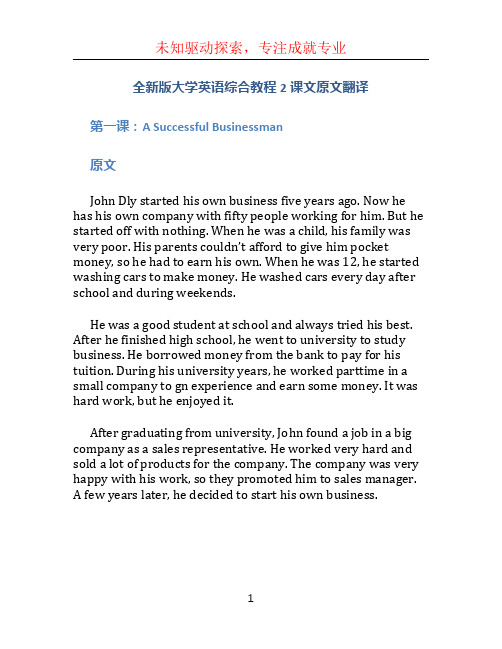
全新版大学英语综合教程2课文原文翻译第一课:A Successful Businessman原文John Dly started his own business five years ago. Now he has his own company with fifty people working for him. But he started off with nothing. When he was a child, his family was very poor. His parents couldn’t afford to give him pocket money, so he had to earn his own. When he was 12, he started washing cars to make money. He washed cars every day after school and during weekends.He was a good student at school and always tried his best. After he finished high school, he went to university to study business. He borrowed money from the bank to pay for his tuition. During his university years, he worked parttime in a small company to gn experience and earn some money. It was hard work, but he enjoyed it.After graduating from university, John found a job in a big company as a sales representative. He worked very hard and sold a lot of products for the company. The company was very happy with his work, so they promoted him to sales manager.A few years later, he decided to start his own business.翻译约翰·戴利在五年前开始了自己的生意。
- 1、下载文档前请自行甄别文档内容的完整性,平台不提供额外的编辑、内容补充、找答案等附加服务。
- 2、"仅部分预览"的文档,不可在线预览部分如存在完整性等问题,可反馈申请退款(可完整预览的文档不适用该条件!)。
- 3、如文档侵犯您的权益,请联系客服反馈,我们会尽快为您处理(人工客服工作时间:9:00-18:30)。
大学英语综合教程课文翻译One Writer's Beginnings1 I learned from the age of two or three that any room in our house, at any time of day, was there to read in, or to be read to. My mother read to me. She'd read to me in the big bedroom in the mornings, when we were in her rocker together, which ticked in rhythm as we rocked, as though we had a cricket accompanying the story. She'd read to me in the dining room on winter afternoons in front of the coal fire, with our cuckoo clock ending the story with "Cuckoo", and at night when I'd got in my own bed. I must have given her no peace. Sometimes she read to me in the kitchen while she sat churning, and the churning sobbed along with any story. It was my ambition to have her read to me while I churned; once she granted my wish, but she read off my story before I brought her butter. She was an expressive reader. When she was reading "Puss in Boots," for instance, it was impossible not to know that she distrusted all cats.作家起步时我从两三岁起就知道,家中随便在哪个房间里,白天无论在什么时间,都可以念书或听人念书。
母亲念书给我听。
上午她都在那间大卧室里给我念,两人一起坐在她那把摇椅里,我们摇晃时,椅子发出有节奏的滴答声,好像有只唧唧鸣叫的蟋蟀在伴着读故事。
冬日午后,她常在餐厅里烧着煤炭的炉火前给我念,布谷鸟自鸣钟发出“咕咕”声时,故事便结束了;晚上我在自己床上睡下后她也给我念。
想必我是不让她有一刻清静。
有时她在厨房里一边坐着搅制黄油一边给我念,故事情节就随着搅制黄油发出的抽抽搭搭的声响不断展开。
我的奢望是她念我来搅拌;有一次她满足了我的愿望,可是我要听的故事她念完了,她要的黄油我却还没弄好。
她念起故事来富有表情。
比如,她念《穿靴子的猫》时,你就没法不相信她对猫一概怀疑。
2 It had been startling and disappointing to me to find out that story books had been written by people, that books were not natural wonders, coming up of themselves like grass. Yet regardless of where they came from, I cannot remember a time when I was not in love with them —with the books themselves, cover and binding and the paper they were printed on, with their smell and their weight and with their possession in my arms, captured and carried off to myself. Still illiterate, I was ready for them, committed to all the reading I could give them.当我得知故事书原来是人写出来的,书本原来不是什么大自然的奇迹,不像草那样自生自长时,真是又震惊又失望。
不过,姑且不论书本从何而来,我不记得自己有什么时候不爱书——书本本身、封面、装订、印着文字的书页,还有油墨味、那种沉甸甸的感觉,以及把书抱在怀里时那种将我征服、令我陶醉的感觉。
还没识字,我就想读书了,一心想读所有的书。
3 Neither of my parents had come from homes that could afford to buy many books, but though it must have been something of a strain on his salary, as the youngest officer in a young insurance company, my father was all the while carefully selecting and ordering away for what he and Mother thought we children should grow up with. They bought first for the future .我的父母都不是来自那种买得起许多书的家庭。
然而,虽然买书准得花去他不少薪金,作为一家成立不久的保险公司最年轻的职员,父亲一直在精心挑选、不断订购他和母亲认为儿童成长应读的书。
他们购书首先是为了我们的前程。
4 Besides the bookcase in the living room, which was always called "the library", there were the encyclopedia tables and dictionary stand under windows in our dining room. Here to help us grow up arguing around the dining room table were the Unabridged Webster, the Columbia Encyclopedia, Compton's Pictured Encyclopedia, the Lincoln Library of Information, and later the Book of Knowledge. In "the library", inside the bookcase were books I could soon begin on —and I did, reading them all alike and as they came, straight down their rows, top shelf to bottom. My mother read secondarily for information; she sank as a hedonist into novels. She read Dickens in the spirit in which she would have eloped with him. The novels of her girlhood that had stayed on in her imagination, besides those of Dickens and Scott and Robert Louis Stevenson, were Jane Eyre, Trilby, The Woman in White, Green Mansions, King Solomon's Mines.除了客厅里有一向被称作“图书室”的书橱,餐厅的窗子下还有几张摆放百科全书的桌子和一个字典架。
这里有伴随我们在餐桌旁争论着长大的《韦氏大词典》、《哥伦比亚百科全书》、《康普顿插图百科全书》、《林肯资料文库》,以及后来的《知识库》。
“图书馆”书橱里的书没过多久我就能读了——我的确读了,全都读了,按着顺序,一排接着一排读,从最上面的书架一直读到最下面的书架。
母亲读书最重要的不在获取信息。
她是为了享受快乐而埋头读小说。
她读狄更斯时的神情简直就像要跟他私奔似的。
她少女时代读的小说印在了她心头的,除了狄更斯、司各特和罗伯特?路易斯?斯蒂文森等人的作品之外,还有《简?爱》、《切尔比》、《白衣女士》、《绿厦》和《所罗门王的矿藏》。
5 To both my parents I owe my early acquaintance with a beloved Mark Twain. There was a full set of Mark Twain and a short set of Ring Lardner in our bookcase, and those were the volumes that in time united us all, parents and children.多亏了我的父母,我很早就接触了受人喜爱的马克?吐温。
书橱里有一整套马克?吐温文集和一套不全的林?拉德纳作品集,这些书最终将父母和孩子联结在一起。
6 Reading everything that stood before me was how I came upon a worn old book that had belonged to my father as a child. It was called Sanford and Merton. Is there anyone left who recognizes it, I wonder? It is the famous moral tale written byThomas Day in the 1780s, but of him no mention is made on the title page of this book; here it is Sanford and Merton in Words of One Syllable by Mary Godolphin. Here are the rich boy and the poor boy and Mr. Barlow, their teacher and interlocutor, in long discourses alternating with dramatic scenes —anger and rescue allotted to the rich and the poor respectively. It ends with not one but two morals, both engraved on rings: "Do what you ought, come what may," and "If we would be great, we must first learn to be good."我一本接一本阅读摆在我面前的书,读着读着便发现一本又破又旧的书,是我父亲小时候的。
